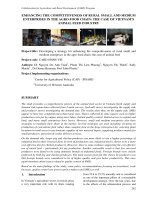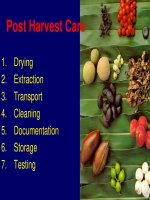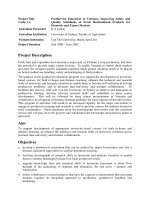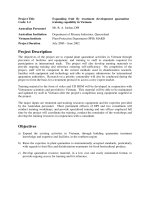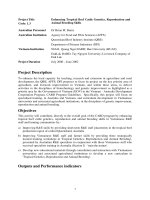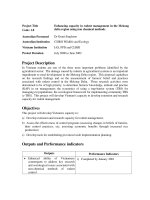Báo cáo nghiên cứu nông nghiệp " Enhancing capacity in rodent management in the Mekong delta region using non chemical methods " pot
Bạn đang xem bản rút gọn của tài liệu. Xem và tải ngay bản đầy đủ của tài liệu tại đây (118.51 KB, 16 trang )
Project Title
Code: 1.8
Enhancing capacity in rodent management in the Mekong
delta region using non chemical methods
Australian Personnel
Dr Grant Singleton
Australian Institution
CSIRO Wildlife and Ecology
Vietnam Institution
IAS, PPD and CLRRI
Proiect Duration
July 2000 to June 2002
Project Description
In Vietnam rodents are one of the three most important problems identified by the
agricultural sector. The damage caused by rodents in agricultural systems is an important
impediment to rural development in the Mekong Delta region. This proposal capitalises
on the research findings and on the measurement of farmers' belief and practises
associated with rodent control in the Mekong Delta. Three research activities were
determined to be of high priority: to determine farmers' knowledge, attitude and practise
(KAP) in rat management; the economics of using a trap-barrier system (TBS) for
managing rat populations; the sociological framework for implementing community TBS
(c-TBS). This project will develop Vietnam's capacity to develop extension and research
capacity for rodent management.
Objectives
This project will develop Vietnam's capacity to:
a) Develop extension and research capacity for rodent management,
b) Assess the effectiveness of control programs (assessing changes in beliefs of farmers,
their control practices, etc; assessing economic benefits through increased rice
production)
c) Develop tools for establishing provincial wide implementation planning.
Outputs and Performance indicators
Outputs
Performance Indicators
♦ Enhanced ability of Vietnamese
counterparts to address key research
and sociological issues associated with
non-chemical methods of rodent
control
i) Completed by January 2001
♦ Tested the capacity developed (above)
at demonstrated sites within a province
i) Completed by Feb 2001 to March 2002
♦ Assessed the sociological framework
for implementation and benefit cost of
village-level rodent management
i) Reviewed and developed, in consultation
with PPDs and farmers, a provincial-
wide process for implementing and
assessing effective rodent management
(April to June 2002).
PROJECT COMPLETE REPORT
Executive Summary
The project was finalised in mid-October 2002 with all components completed to
schedule and to high standard. The project objectives and design proved highly
appropriate, especially through the close integration of the ecological, agronomic, and
sociological components of the project.
Each of the four primary project objectives was met. We believe that the first objective
(enhancing ability of Vietnamese scientists) was met to the highest level of achievement,
due in great measure to their outstanding application and contribution to this project. The
remaining objectives were also met to fully satisfactory standard.
All key tasks were implemented to high standard and within the project time frame and
budget. Minor implementation problems were encountered due to the late onset of the
wet season in 2002. However, these problems highlighted important practical issues that
led to an improved understanding of the proposed rodent control methodology. Several
additional tasks were undertaken as a result of new issues surfacing during the course of
the project. These included i) an analysis of historical records of rodent damage; ii) An
anthropological study of farmer adoption of the main rodent management technology
being tested, this was achieved through increased collaboration with the International
Rice Research Institute, Philippines, iii) trials of alternative trap designs; iv) development
of new methods of damage assessment; v) a market study of the live rat-meat trade; and
vi) a pilot study of potential human health risks associated with the live rat-meat trade.
The Vietnamese project participants have performed strongly in all scientific and
management areas. Their efforts, together with the enthusiastic response from farmers in
each of the participating villages, have jointly underpinned the success of this project at
all levels. The overall success of the project is indicated by firstly the strong promotion of
the major outputs of the project at a wrap-up meeting in My Tho. Approximately 110
extension personnel from 21 provinces (20 in the south, one in the north), 35 farmers
from 3 provinces, 10 Vietnamese scientists from 4 institutes (3 in the south, one in the
north) and 5 high ranking politicians, attended the final meeting. The national and
provincial television and print media covered this event. Secondly, the announcement at
the meeting of a strong commitment on the part of the GOV to provide significant funds
to establish demonstration sites for non-chemical rodent management in 8 provinces in
North, Central and South Vietnam.
1. Project Description
1.1 Background and preparation
More than 90% of the world’s rice is produced and eaten in Asia, with rice providing 35-
60% of the total food energy for the three billion people living in the region. In Vietnam,
the rodent problem has escalated in the past 5-10 years. For example, the area of crops
with high rat damage increased from approximately 50,000 ha in 1993 to more than
310,000 ha (mainly rice) in 1997. In June 1997, the Vietnamese Ministry for Agriculture
and Rural Development classified rodents as one of the three most important problems
faced by the agricultural sector.
Initial research on this problem was conducted under ACIAR project AS1/9679 -
“Management of Rodent Pests in Vietnam”. Key outputs from this project, which was
conducted in the Mekong and Red River deltas, were:
• Development of a cost effective method of physical rodent control – the
community Trap Barrier System (CTBS): a lure-crop is set inside a plastic fence
with live capture traps, the lure crop planted three weeks earlier than the
surrounding crop;
• Rice levee banks wider than 400 mm and higher than 400 mm were identified as
the primary breeding requirement for the major pest species (the Ricefield Rat);
and
• Identification of the optimal timing, location and scale of rodent management
actions that were consistent with goals of sustainable agriculture, minimal
environmental impact and humaneness.
A pilot study of farmers’ attitudes and beliefs on rodent control in the Mekong Delta of
Vietnam was conducted by staff from the International Rice Research Institute (IRRI),
Vietnamese Plant Protection Department (PPD), Cuu Long Rice Research Institute
(CLRRI) and South Regional Plant Protection Centre (SRPPC).
The CARD project capitalised on the research results and extension linkages developed
during each of these precursor activities. The project team was assembled to include
representatives of all of the key research and extension agencies in south Vietnam, and to
provide expert support for each of the key areas of rodent ecology and sociology. CSIRO
staff contributed expertise in rodent ecology. IRRI staff provided expertise on integrated
pest management (IPM), and sociological issues associated with pest management
programs. Anthropological expertise was also provided by IRRI, additional to what was
agreed at the beginning of the project. This proved to be an excellent addition, leading to
an insightful appraisal of the factors that are likely to influence the future adoption of
ecologically-based management of rodent pests in the Mekong delta.
1.2 Context and rationale
The following series of successful workshops maintained the necessary contact between
the project participants and provided timely opportunities for discussion and critical
reappraisal of the project objectives and design as it progressed:
• Initial planning workshop in Ho Chi Minh City (HCMC) on 21-22 September
2000;
• Planning workshop for core project team in HCMC on 26 Feb 2001;
• Training workshop for provincial participants at My Tho on 27 Feb-2 Mar
2001;
• Review workshop for core project team in Hanoi on 21-22 Sept 2001 (held in
conjunction with an annual review meeting for ACIAR project AS1/98/36);
• Review workshop for core project team in My Tho on 4-5 March 2002; and
• Final review workshop for project participants in My Tho on 7-9 August
2002.
The Training workshop in 2001 was attended by delegates from 14 provincial sub-PPDs.
As a consequence, CTBS trials were established outside of the core project in two
additional provinces (Bac Lieu and Tra Vinh).
During the life of the CARD project, another related project was carried out in Bac Binh
district in Bin Thuan Province, funded under a joint ACIAR-World Vision Vietnam
initiative. The aim of this project was to introduce CTBS and other methods of non-
chemical control to this badly rodent-affected region to the east of the Mekong Delta.
This ongoing project has benefited greatly from, and contributed significantly to, the
overall success of the CARD project.
Another important spin-off activity from the CARD project was a study of the Mekong
rat-meat market by SRPPC and An Giang University; CSIRO and the Queensland State
Health Services (QSHS) also assessed potential human health risks associated with the
rat-meat trade. This important avenue of investigation will be pursued by PPD, CSIRO,
IRRI and QSHS.
The Final Review Workshop in August 2002 was attended by representatives from Bac
Lieu and Binh Thuan Provinces, and from An Giang University.
1.3 Project objectives and scope at design
The primary objectives of this project were:
i) to develop the research and implementation capacity of Vietnamese
agricultural researchers in the area of ecologically-based (non-chemical)
rodent management; and
ii) to assist with the development of a regional plan for implementation and
monitoring of effective rodent management.
This broader objective is consistent with the current directions and priorities of the
Government of Vietnam (GOV) for pest management in agricultural systems.
Ultimate benefits for Vietnam would be a reduction in crop losses to rodents and a likely
reduction in chemical use through integrating a range of alternative control actions and
ensuring each is affordable and ecologically sustainable.
1.4 Implementation arrangements
CSIRO was responsible for overall project management and provided expertise in rodent
taxonomy and ecology. IRRI provided expertise in sociology and anthropology. Within
Vietnam, the rodent ecology field program was implemented by staff from the Institute of
Agricultural Science (IAS), agronomic fieldwork was performed by staff if IAS, SRPPC
and CLRRI, sociological data were gathered by staff of PPD and CLRRI.
2. Appropriateness of Project Design and Objectives
2.1 Appropriateness of Objectives
The project objectives were all found to be highly appropriate, as indicated in the
following table:
Objective
No./Ref.
Objective Description
Appropriateness Rating
(1)
(2)
(3)
(4)
Enhance ability of Vietnamese
counterparts to address key research and
sociological issues associated with non-
chemical methods of rodent control
Tested the capacity developed in (1) at
demonstration sites
Assess the sociological framework for
implementation and benefit-cost of
village-level rodent management
Review and develop, in consultation with
PPD, sub-PPDs and farmers, a provincial-
wide process for implementing and
assessing effective rodent management
The close integration of biological,
sociological and IPM expertise was
highly appropriate. Rating 5
The testing of methods and
hypotheses developed from (1) at
appropriate scale (village) resulted
in significant new insights. Rating 5
Essential to measure impact
and to gain insights into
opportunities and barriers to broad-
scale adoption
Rating 5
Essential to consider how methods
can be applied at broader scale and
across a range of ecological and
socio-economic contexts. Rating 5
5: Best Practice; 4: Fully Satisfactory; 3: Satisfactory Overall; 2: Marginally Satisfactory;
1: Weak.
2.2 Appropriateness of Design
The project design proved highly appropriate, especially so the close integration of the
ecological and sociological components of the project. By working closely together at the
various planning and review workshops and at the field sites, biologists and social
scientists both gained a new level of understanding of the complex ecological and social
issues that, in combination, would influence the effectiveness and acceptability of the
recommended rodent management strategies.
This mutual learning process was further enhanced by the involvement of sub-PPD staff
and participating farmers in each of the major workshops. Although this brought some
difficulties in terms of the need for constant language translation, the result was some
critical insights and identification of issues that otherwise might not have surfaced.
Description of Design Features
Appropriateness
Rating
(1) Farmer surveys on knowledge, application and practices on rat
management; planning workshop, stake-holder meetings, needs
assessment; technical training of provincial staff for CTBS;
establish village study on common property decisions;
Rating 5
(2) Establish village-level rodent management using CTBS; monitor
farmer actions; undertake village study on common property
actions;
Rating 5
(3) Collect data on crop damage by rodents and costs of
management actions; conduct study on CTBS adoption
Rating 4
(4) Final review workshop; recommendations of principles for
rodent management in the Mekong delta
Rating 5
5: Best Practice; 4: Fully Satisfactory; 3: Satisfactory Overall; 2: Marginally Satisfactory;
1: Weak.
3. Implementation Performance
3.1 Project Components and Outputs
All key tasks were implemented to high standard and within the project time frame and
budget.
Major project outputs are listed below:
1. Project planning workshop in HCMC 21-22 September 2000 (agenda, list of
participants and report attached – items 1a, 1b, 1c)
2. Report “The performance of TBS in control rice field rat in the Mekong Delta’ by
Mr La Pham Lan (IAS). (Presented to planning workshop; copy attached – item
2).
3. Technical Training Workshop for provincial sub-PPD staff in Tien Giang 27
February-2 March; (agenda, list of participants, report attached – items 3a, 3b,
3c).
4. Review workshop for core project team in Hanoi on 21-22 Sept 2001 (held in
conjunction with an annual review meeting for ACIAR project AS1/98/36);
(agenda, list of participants, report attached – items 4a, 4b, 4c).
5. Review workshop for core project team in My Tho on 4-5 March 2002; (agenda,
list of participants, report attached – items 5a, 5b, 5c).
6. Final review workshop for project participants in My Tho on 7-8 August 2002;
(agenda, list of participants, report attached – items 6a, 6b, 6c).
7. Public ceremony in My Tho on 9 August 2002.to celebrate completion of project
and announce new initiatives by GOV; (agenda – item 7)
8. Nine papers (6 spoken; 3 posters) submitted for 2
nd
International Conference on
Rodent Biology and Management, to be held in Bogor, Indonesia 28 Oct – 1 Nov
2002 (the proceedings are refereed and will be pre-published in mid October 2002
as ACIAR Monograph No.98 with all 9 as full papers). Authorship and titles as
follows:
(a) Cuong, L.Q., Chien, H.V., Han, L.V., Duc, V.H., and
Singleton, G.R.
“Relationship between rodent damage and
yield loss in rice in Mekong Delta” (item 8a)
(b) Palis, F.G., Morin, S., Chien, H.V. and Chi, T.N. “Socio-
cultural and economic assessment of CTBS adoption in South
Vietnam.” (item 8b)
(c) Morin, S.R., Palis, F.G., Chien, H. V., Chi, T.N., Magsumbol,
M. and Papag, A. 2002. “A sociological perspective on
community based trap barrier system”. (item 8c).
(d) Lan, L.P., Aplin, K.P., Hung, N.M., Quoc
1
, Chien, H.V., Sang,
N.D., and Singleton, G.R. “Rodent communities and historical
trends in rodent damage in the Mekong Delta of Vietnam:
establishing an ecological basis for effective management”
(item 8d)
(e) Khiem, N.T., Cuong, L.Q., and Chien, H.V. “Market Study of
meat from field rats in the Mekong Delta”. (item 8e)
(f) Singleton, G.R., Smythe, L., Smith, G., Spratt, D.A., Aplin, K.
and Smith, A.L. “Rodent diseases in southeast Asia and
Australia: inventory of recent surveys”. (item 8f)
(g) Sang, P.M., Huan, N.H., Escalada, M.M. and Heong, K.L.
“Farmers’ beliefs and practices in rat management in the
Mekong Delta, Vietnam” (Item 8g)
(h) Aplin, K.P., Chesser, T. and ten Have, J. “The evolutionary
biology of Rattus: profile of an archetypal rodent pest”
(i) Aplin, K.P., Frost, A., Tuan, N.P., Lan, L.P. and Hung, N.M.
“Notes on the identification of Bandicota species in Southeast
Asia”
9. Decision made at final review workshop (7-8 August 2002) to seek urgent
funding support from FAO TCP scheme to support monitoring of uptake of CTBS
and other aspects of recommended technology across Vietnam (see workshop
report – item 6c). If there is a future round of CARD, Vietnam, then a project
could be developed to link with this initiative through developing and
implementing a national campaign for ecologically-based management of rats.
Colleagues at the International Rice Research Institute are keen to be involved in
this next phase of capacity building because of the success of the current CARD
project.
The performance against each component using the scale is given below.
Compo
n-ent
No.
Component Description Outputs Performance
Indicators
*
Performance
rating
1.1 Complete farmer surveys on
their knowledge, application and
practices (KAP) on rat
management in Mekong Delta
8g 4
1.2 Continue study on sociology of
implementing CTBS
8c 4
1.3 Conduct planning workshop, site
visits, stake-holder meetings,
needs assessment
1 4
1.4 Conduct technical training of
PPD/Provincial Government
staff for implementation of
CTBS; more extensive training
to participants from 14 provinces
was also provided in February
2001
3 5
1.5 Baseline data collection on
CTBS adoption in pilot
provinces
8b 4
1.6 Establish village level study on
common property decisions in
8b 4
community actions
2.1 Establish village-level rodent
management using CTBS
4
2.2 Monitor farmer actions 4
2.3 Repeat for dry season crop 4
2.4 Continue village level study on
common property actions
8b, 8c 4
3.1 Collect data on crop damage by
rodents and costs of management
actions
8a,8b 4
3.2 Analysis of data for review
workshop
8a 4
3.3 Repeat for dry season crop 4
3.4 Conduct study on CTBS
adoption in pilot provinces
8b 4
4.1 Wrap-up workshop 6 5
4.2 Recommendations of principles
(sociological, training, research)
for rodent management in the
Mekong delta
7,9 4
5: Exceeding time and quality targets, 4: Achieving time and quality targets and on
budget; 3: Moderate progress towards targets, some issues about quality, budgets or costs
but these are being adequately addressed; 2: Some progress towards targets, but slippage
in schedule and cost overruns; & 1: Significant problems in achieving targets, quality
outputs unlikely to be achieved and substantial cost increases affecting overall budget.
*
Note: Specific performance indicators were not specified in the project design
Several additional tasks were undertaken as a result of new issues surfacing during the
course of the project. The most important of these were:
• Taxonomic analysis of the major pest rodents in the Mekong Delta (Outputs
8h,8i)
• Analysis of historical records of rodent damage to crops across all of the
Mekong Delta provinces; (Output 8d)
• Development of a framework for understanding CTBS by redefining it as a
common property resource (CPR) and thus subject to many of the same
constraints and opportunities as other CPRs. This approach documented
challenges to CTBS adoption, principal among these are the free rider, issues
of transparency and equity, and the use of existing institutional structures for
resource management. This study indicated a positive future for ecologically-
based management of rats built around the CTBS concept and concluded with
a set of testable hypotheses. (Output 8c)
• Trials of several alternative trap designs, with the dual purpose of i)
improving capture rates; and ii) exploring cheaper options;
• Systematic recording of habitat structure around each of the CTBS units, after
it was observed that capture rates could vary considerably between TBS units,
even within a single hamlet;
• Development of a more comprehensive system of damage assessment around
the TBS units, designed to more fully identify the ‘halo’ of crop protection
around each unit;
• Detailed market study (with MSc student) of Mekong rat-meat business
headed by Dr Khiem of An Giang University; (Output 8e)
• Analysis of rats from rat-meat processing plants for zoonoses (leptospirosis
and hantaviruses) to investigate potential human health risks; analysis
performed by Queensland Health Scientific Services (QHSS). (Output 8f)
In most cases these additional activities were initiated and successfully implemented by
staff of the Institute of Agricultural Science (IAS), SRPPC, PPD, and the Cuu Long Rice
Research Institute, with some assistance from CSIRO and IRRI staff.
3.2 Project Outcomes
The project has produced the following key outcomes:
• Research and implementation capacity has been significantly enhanced within
all participating Vietnamese agencies;
• CTBS, as a key component of ecologically-based rodent management, has
been demonstrated to be an effective means for controlling rodents in rice
fields.
• The sociological parameters that are likely to influence the outcome of
village-level rodent management have been established; and
• The necessary skills, resources and commitment have been fostered within
key Vietnamese agencies (IAS, PPD, SRPPC, sub-PPDs) to enable regional
implementation and monitoring of effective non-chemical rodent
management.
Further details are provide under 4.1
3.3 Sectoral Impact
The proposed rodent control methods can be implemented by any landowner and is not
gender specific. The methods are less demanding on hard physical labour than some of
the traditional practices (eg digging of burrows) and are thus more accessible to women
and people with physical disability. The methods are also much safer than the recently
increased practice of poison use that poses a special threat to women who are either
pregnant or nursing.
3.4 Costs and Financing
Cost estimates at design proved to be very close to actual costs incurred, both for the in-
country and external partner organisations. A full aquittal cannot be provided until the
end of October after all funds are expended. However, a summary of expenditure during
the 2001-2002 finacial year is attached. All budget items are on track for completion
within budget.
3.5 Monitoring of project
The reporting schedule and requirements of CARD have been appropriate and a useful
component of the project internal review process as it has stimulated a regular stocktake
of activities and outputs. Email contact among the partner institutions has been vital to
the success of the project, and should be considered as a vital component of future
projects of this kind, with funding support for improved email facilities where necessary.
3.6 Technical Assistance, Training and Capacity Building
The project was designed to develop Vietnam’s capacity in three main areas of research
and extension capacity for rodent management.
(i) Research capacity in the area of rodent ecology and chemical-free rodent
management (with assistance from CSIRO);
(ii) Research and implementation capacity in sociological aspects of rodent
management, primarily through assessment of changes in the knowledge,
attitudes and practices (KAP) of farmers; and assessment of economic
benefits to costs of rodent management (with assistance from IRRI); and
(iii) Implementation and extension capacity in the development of effective
region-wide promotion, support and monitoring of new rodent
management strategies.
The research and implementation capacity of our Vietnamese counterparts has been
significantly enhanced as a consequence of the close working relationships established
between staff of IAS, PPD, SRPPC and CLRRI and staff of CSIRO and IRRI.
Core project activities were conducted within two provinces (Tien Giang and Soc Trang).
However, training activities often involved participants from other provinces within the
Mekong Delta and this led several provinces to independently commence rodent
management trials within the time frame of the project. These additional activities
provided some extremely valuable insights into the likely adoption rate of the new
technology and strategies.
The following successful workshops were held for project participants:
• Initial planning workshop in Ho Chi Minh City (HCMC) on 21-22 September
2000;
• Planning workshop for core project team in HCMC on 26 Feb 2001;
• Training workshop for provincial participants at My Tho on 27 Feb-2 Mar
2001;
• Review workshop for core project team in Hanoi on 21-22 Sept 2001 (held in
conjunction with an annual review meeting for ACIAR project AS1/98/36);
• Review workshop for core project team in My Tho on 4-5 March 2002; and
• Final review workshop for project participants in My Tho on 7-9 August
2002.
The Training workshop in 2001 was attended by delegates from 14 provincial sub-PPDs.
As a consequence, CTBS trials were established outside of the core project in two
additional provinces: Bac Lieu and Tra Vinh.
The Review workshops in March 2002 and the Final workshop in August 2002 were both
attended by representatives from Bac Lieu and Binh Thuan Provinces. Bac Binh district
in Bin Thuan Province is the location of another related project, a joint ACIAR-World
Vision Vietnam initiative to introduce the CTBS and other methods of non-chemical
control into this badly rodent-affected cropping environment.
3.7 Management of Constraints, Issues, Risks and Change
The project suffered some initial delays relating to finalisation of the contract and
disbursement of project funds. However, efficient work on the part of all partners through
the first 6 months brought the project back onto schedule.
Some problems were encountered with establishment of CTBS at specific sites due to the
late onset of the wet season in 2002. This problem was overcome by changing the
location of some CTBS units, with care taken to select closely similar contexts.
Several important constraints to the wider adoption of non-chemical rodent management
were identified during the course of the project. These related to three main areas:
1. Ecological issues relating to the question of what regulates seasonal or inter-
annual changes in rodent abundance in different parts of the Mekong Delta
(hydrological regimes vs farming systems);
2. Practical issues relating to access to critical resources (particularly water,
threshing machines); and
3. Sociological issues relating to the formation and maintenance of community
groups and networks in order to ensure a coordinated approach to rodent
control.
Identification of these issues is in itself a significant outcome of this project, as it is now
possible to frame specific hypotheses related to the adoption of recommended rodent
control strategies, and to design appropriate trials and monitoring regimes. The
development of a sociological framework for understanding CTBS by redefining it as a
common property resource provided specific recommendations that will guide capacity
building for ecologically-based management of rodent pests at the regional level.
3.8 Project Management
The strong management performance of IAS, PPD and sub-PPD staff, and the
enthusiastic response from farmers in each of the participating villages, have jointly
underpinned the success of this project at all levels.
The project managers in the respective Vietnamese institutions have been highly
responsive throughout the project for requests for information from CSIRO and IRRI
staff. Furthermore, they implemented in a timely manner the recommendations that arose
from the workshops held in HCMC in February 2001 and in Hanoi in September 2001.
(Ranking 5)
5: Best Practice; 4: Fully Satisfactory; 3: Satisfactory Overall; 2: Marginally Satisfactory;
1: Weak.
4. Performance and Outcomes
4.1 Assessment of Performance Aganist Objectives and Design
The project has been highly successful in respect of all major objectives:
• Research and implementation capacity has been significantly enhanced within
all participating agencies;
• This capacity has been tested and demonstrated through the completion of
successful field trials and sociological studies in two provinces, involving
integrated action by IAS, PPD, SRPPC and sub-PPDs;
• The sociological parameters that will influence the outcome of village-level
rodent management have been established through KAP surveys and benefit-
cost analyses; and
• The necessary skills, resources and commitment have been fostered within
key Vietnamese agencies (IAS, PPD, SRPPC, sub-PPDs) to enable regional
implementation and monitoring of effective non-chemical rodent
management.
CTBS, as a key component of ecologically-based rodent management, was demonstrated
to be an effective means for controlling rodents in rice fields. It showed a high rate of
return on investment and individual labour costs remain relatively low. The sociological
and anthropological findings indicate that it is sustainable in both the short and long-term.
Farmers appreciated the ingenuity and complexity of the system and have suggested
effective alternatives to the system to fit their local conditions.
Several important constraints to the wider adoption of non-chemical rodent management
were identified during the course of the project. These related to three main areas:
1. Ecological issues relating to the question of what regulates seasonal or inter-
annual changes in rodent abundance in different parts of the Mekong Delta
(hydrological regimes vs farming systems);
2. Practical issues relating to access to critical resources (particularly water,
threshing machines); and
3. Sociological issues relating to the formation and maintenance of community
groups and networks in order to ensure a coordinated approach to rodent
control.
Identification of these issues is in itself a significant outcome of this project, as it is now
possible to frame specific hypotheses related to the adoption of recommended rodent
control strategies, and to design appropriate trials and monitoring regimes. The
development of a sociological framework for understanding CTBS by redefining it as a
common property resource provided specific recommendations that will guide capacity
building for ecologically-based management of rodent pests at the regional level.
Like many technologies CTBS will work best where farmers understand the technology
and have the social and institutional background to effectively apply it. The multi-
disciplinary mix of biologists, sociologists and agronomists in the project provided a
breadth of capacity building for Vietnam scientists and extension staff. It also highlighted
to our Vietnamese colleagues (scientists, extension staff, policy makers AND farmers)
the strong benefits of collaborating across disciplines when addressing challenging
agricultural issues such as rodent management.
The overall success of the project is indicated by the commitment on the part of the GOV
of significant funds to establish demonstration sites for non-chemical rodent management
in 8 provinces in North, Central and South Vietnam.
Two spin-off activities also represent significant outcomes of the CARD project:
• The study of the Mekong rat-meat market by SRPPC and An Giang
University and of associated potential human health risks by CSIRO and
QSHS; this important avenue of investigation will be pursued by PPD,
CSIRO, IRRI and QSHS.
• The ongoing ACIAR-World Vision Vietnam project in Bin Thuan Province;
this project has benefited greatly from, and contributed significantly to, the
overall success of the CARD project.
4.2 Sustainability
The project was carefully designed to maximise issues relating to technical (including
curricula), environmental, social/community and gender sustainability.
The high level of expertise and professionalism displayed by IAS biologists and PPD and
CLRRI sociologists suggests that the research capacity built during this project is highly
sustainable. (Ranking 5)
The decision on the part of the GOV to provide significant funding for further CTBS
trials and demonstrations in selected provinces throughout Vietnam suggests that
technology and strategy transfer is moderately to highly sustainable (Ranking 4 or 5).
The enthusiastic response of sub-PPD staff and farmers to the recommended rodent
management methods suggests that the future uptake rate will be satisfactory to excellent
(Ranking 3-5). However, further monitoring of support and uptake levels will be needed
over several years to fully judge sustainability in both of these areas.
Overall, we consider that the project has achieved Best Practice in regard to
Sustainability, at least in the short to medium time frame of 2-5 years. (Ranking 5)
5: Best Practice; 4: Fully Satisfactory; 3: Satisfactory Overall; 2: Marginally Satisfactory;
1: Weak.
4.3 Development Impact
The project has had strong and very likely lasting impact in two main areas:
• The improved research and implementation capacity of our Vietnamese
counterparts
• The establishment of close and mutually beneficial relationships between
Vietnamese agencies and between the agencies and the two external partners
(CSIRO with IAS, SRPPC and PPD; IRRI with PPD, CLRRI and An Giang
University).
All partners have benefited from the close integration within the project of biology,
agronomy and sociology. This genuinely multi- and cross-disciplinary approach has been
critical to the identification of key issues and constraints, and has greatly enhanced the
learning experience for all project participants.
The lasting success of the project is indicated by the commitment on the part of the GOV
of significant funds to establish demonstration sites for non-chemical rodent management
in 8 provinces in North, Central and South Vietnam.
5. Conclusions
5.1 Overall Assessment
The project has provided a solid foundation for the implementation of ecologically-based,
non-chemical methods of rodent management in the Mekong Delta (and potentially
elsewhere in Vietnam). In large part, the success of the project can be attributed to the
close integration of rodent biology, agronomy and sociology at all stages in planning,
training and project implementation. This genuinely multi- and cross-disciplinary
approach has been critical to the identification of key issues and constraints, and has also
greatly enhanced the learning experience for all project participants.
The research and implementation capacity of our Vietnamese counterparts has been
significantly enhanced as a consequence of the close working relationships established
between staff of IAS, PPD, SRPPC and CLRRI and staff of CSIRO and IRRI.
Non-chemical methods of rodent management were trialed at appropriate (village-level)
scale and found to be successful in reducing crop damage, in reducing the level of
chemical usage, and in fostering a community-approach to rodent management. The key
sociological parameters that will influence the outcome of village-level rodent
management have been established and appropriate methods developed to assess benefit-
cost ratios under differing conditions.
CTBS, as a key component of ecologically-based rodent management, was demonstrated
to be an effective means for controlling rodents in rice fields. It showed a high rate of
return on investment and individual labour costs remain relatively low. The sociological
and anthropological findings indicate that it is sustainable in both the short and long-term.
Farmers appreciated the ingenuity and complexity of the system and have suggested
effective alternatives to the system to fit their local conditions.
Like many technologies CTBS will work best where farmers understand the technology
and have the social and institutional background to effectively apply it. The multi-
disciplinary mix of biologists, sociologists and agronomists in the project provided a
breadth of capacity building for Vietnam scientists and extension staff. It also highlighted
to our Vietnamese colleagues (scientists, extension staff, policy makers AND farmers)
the strong benefits of collaborating across disciplines when addressing challenging
agricultural issues such as rodent management.
The Government of Vietnam has demonstrated its commitment to the future of non-
chemical methods of rodent control through the announcement of significant ongoing
funding the establish field trial / demonstration sites in 8 provinces in North, Central and
South Vietnam.
Several spin-off projects have developed during the life of the CARD project, including
one that relates to significant human health issues in the Mekong Delta region.
5.2 Lessons Learned
In large part, the success of the project can be attributed to the close integration of rodent
biology, agronomy and sociology at all stages in planning, training and project
implementation. This genuinely multi- and cross-disciplinary approach has been critical
to the identification of key issues and constraints, and has also greatly enhanced the
learning experience for all project participants.


